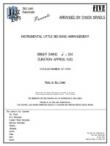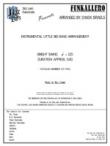Chuck Israels : reinventing jazz composition and arranging
By Heather Crocker
Chuck Israels is best known for his work with the Bill Evans Trio (1961-1966). Yet perhaps his real legacy lies in his contributions to jazz repertory. As founder and director of the National Jazz Ensemble (1973-1981), Israels created a repertory orchestra that brought a fresh approach to jazz classics. During his years as an educator, bass player, arranger and bandleader, he has written over three hundred arrangements. The influence of his years with Bill Evans is evident. Actually, Israels says he became interested in writing while working with Evans: "Behind all the spontaneity and responsiveness to the moment that was part and parcel of that music, was a deep-seated organization of musical elements that Bill worked hard to prepare and keep in control... As I realized increasingly how this balance of elements worked, I thought I might, over time, be able to learn to do something like that myself as a writer."
Israels interpreted Evans' concepts of rhythm and harmony and applied them to arranging. His arrangements have a rhythmic inventiveness that is unsurpassed and seldom seen in jazz arranging, especially for small groups. While the harmonic language is his, the inspiration comes directly from his playing with Bill Evans, which Israels calls "the richest experience of my bass-playing life." Yet Israels cites numerous other influences on his musical thinking. "Certainly J.J. Johnson, early Ahmad Jamal, Ellington and Gil [Evans], and Gerry Mulligan... I am influenced by musical characteristics that exude a spirit of spontaneous timing, conversational timing – like Louis Armstrong's singing, or Ray Charles, Joe Williams, Carmen McRae or Sinatra. Bill Evans and Sonny Rollins are wonderfully rhythmically inventive players, and I take pains to learn how to notate some of those rhythms that are so much fun to play and are so rarely written in ensemble music. I like to present the illusion that players are inventing the music in the moment, but that the music comes out in such an organized and balanced way that the listener is strung along on a thin line between the chaos of individual response and the organization that can only come from one overseeing mind."
What was it about those years with the Evans Trio that so inspired Israels? In Chuck's words, "His consistently reliable control of those complex cross rhythms against a deeply felt pulse made it possible to participate in the music with an intuitive understanding of how they related to the more usual rhythms I could create without understanding how complex and sophisticated they were." His goal was to make that playing experience available to others. “I wrote arrangements for my students that respected their intelligence and mine... Little of what has been available to student jazz ensembles has been remotely interesting to me... If I had heard that music at a young age and been told that it was jazz, I would not have become a jazz musician."
The music that Israels is most passionate about is American popular music from the late 19th century to the mid-1960s, essentially from Sousa and Joplin to post-bop jazz. At that time, popular music was "being written by educated musicians, musicians who understood and appreciated the history of great music but who had an unselfconscious popular sensibility." He cites historian Eric Hobsbawm in describing the changes that followed this golden age of popular music. "In the mid '60s the baby boom generation reached adolescence. 76 million relatively affluent teenagers were suddenly unleashed on a world previously controlled by adults... One of the unfortunate negative effects was that the marketing machinery of popular music turned from where it had been focused – on the needs and sensibilities of educated adults, to satisfying the cravings of underdeveloped adolescent sensibilities..." Intelligent, high quality popular music all but disappeared by 1970, in Israels' eyes.
Knowledge of music history (i.e., pre-rock-and-roll era) has also largely vanished among American pop artists. This element is key to Israels' approach to his work. Hall Overton, classical composition professor at Juilliard (and collaborator of Thelonious Monk and Teddy Charles) was Israels' composition and arranging teacher. This relationship, and Overton's grasp of both jazz and classical music, informed Israels' writing style. "If you don't develop an appreciation of music from Bach and Mozart to Ravel and Stravinsky, you ignore useful and powerful examples of effective music..." Israels dismisses the idea that every pitch should be doubled in multiple instruments to conceal missing or weaker players. "My point of view is to make every line independently beautiful. If something happens to be missing, you are still left with beautiful and effective individual parts." He observes, "The National Jazz Ensemble brought me into intimate contact with the music of outstanding jazz composers, starting as early as Jelly Roll Morton and continuing through Ellington and Monk. It's one kind of experience to listen to that music on a recording. It is far deeper to transcribe and perform it, so I feel safe in saying that all of that music had an effect on my thinking."
When asked which of his arrangements he's most excited about publishing, Israels replied, "Who is my favorite child? It's that kind of question... Nevertheless, and I say this with some trepidation, because there are plenty of others that are deeply interesting to me, the translations of Bill Evans' music from piano trio pieces to larger ensemble with additional color is a particularly satisfying piece of my work... Unless you establish a powerful new point of view about the music, the results are disappointing. However, if you cull as many of the details of Bill's piano playing as you can and translate them to other instruments, you avoid the problem of direct comparison. And many of those characteristics are transferable – the rhythmic nuances, the formal development, the interplay among the rhythm section instruments, the micro dynamics. All of those can be used to advantage in a band with other instruments. And the resulting music has integrity and emotional power. So I like those arrangements...For me, as for many writers, my favorite work is the one I'm working on now. That keeps me moving forward."
Jazz Lines Publications is proud to be the publisher of Chuck Israels' groundbreaking arrangements. Available now from the Chuck Israels Nonet Series are: Five, Funkallero, Re: Person I Knew, Peri's Scope, Show-Type Tune, Walkin' Up, Waltz for Debby, Very Early, One For Helen, Who Can I Turn To?, and Speak Low. These are most closely associated with Bill Evans' harmonic and rhythmic language, and because of Chuck's involvement with Evans, it seemed natural to start with those. Israels has moved the complex, textured style of the Bill Evans Trio beyond the simplicity of a three-piece group. His achievement is in translating those concepts for a larger ensemble while maintaining a clarity and precision that can be difficult to achieve.
The Jazz Lines Publications Chuck Israels Nonet Series will be part of a new Jazz at Lincoln Center program for college bands, similar to JALC's Essentially Ellington program. Look for the finalists' concert in late 2016 or early 2017.

CHUCK ISRAELS JAZZ LINES PUBLICATIONS SERIES: SET OF ELEVEN ARRANGEMENTS
Based on the Music and Style of Bill Evans
Eleven Jazz Little Big Band Arrangements
Jazz Lines Publications
JLP-1019
$420.00
CHUCK ISRAELS JAZZ LINES PUBLICATIONS SERIES: SET OF ELEVEN ARRANGEMENTS [DOWNLOAD]
Based on the Music and Style of Bill Evans
Eleven Jazz Little Big Band Arrangements
Jazz Lines Publications
JLP-1019-DL
$420.00
ALL THE PRETTY HORSES [DOWNLOAD]
Jazz Nonet Arrangement
Jazz Lines Publications
JLP-7208-DL
$50.00
EVERYBODY LOVES MY BABY [DOWNLOAD]
Jazz Nonet Arrangement with Vocal
Jazz Lines Publications
JLP-9977-DL
$50.00
I'LL SEE YOU IN MY DREAMS [DOWNLOAD]
Jazz Nonet Arrangement
Jazz Lines Publications
JLP-7832-DL
$50.00










